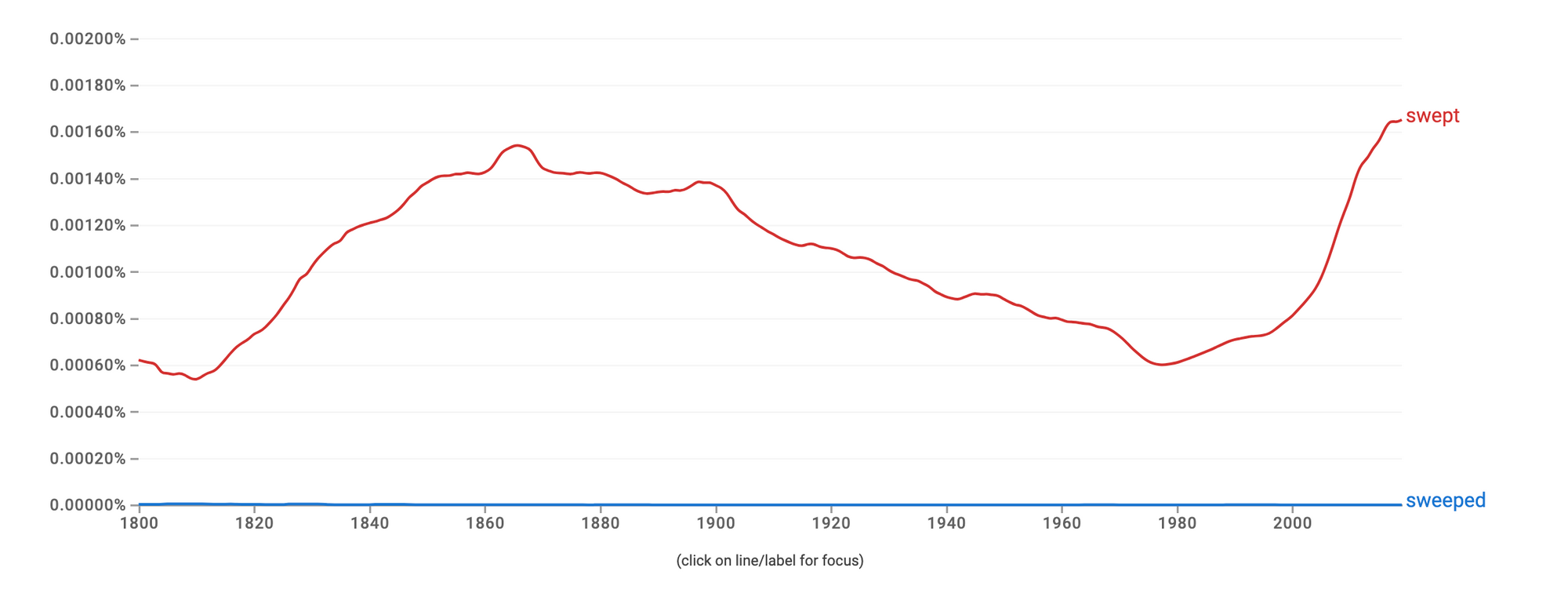- "Sweeped" is the incorrect spelling of "swept."
- "Swept" generally refers to the past tense of the verb "sweep," which means to clean or clear an area by brushing away dirt or debris with a broom or similar tool. It can also be used metaphorically to describe a swift and thorough movement or action.
✅ She swept the kitchen floor with a brisk motion, leaving it gleaming and free of any crumbs.
Yes, that's correct. In the given sentence, "swept" is indeed the past tense of the verb "sweep," and it describes the action of cleaning or clearing the kitchen floor with a brisk motion.
Swept (verb)
Function: Verb (past tense and past participle of sweep)
Meanings:
To clean a surface with or as if with a broom or brush:
- Example: I swept the floor to get rid of the dust.
To move swiftly, forcefully, or overwhelmingly:
- Example: The wind swept the leaves across the garden.
- Figurative Example: A wave of emotion swept over her.
To move or extend in a wide curve or range:
- Example: The coastline swept gracefully southwards.
- Figurative Example: Her gaze swept across the room.
To win all of something:
- Example: The team swept the series, winning every game.
Less common meanings:
- To clear or remove something completely: The tide swept away the footprints.
- To brush or pull hair away from the face: Her hair was swept up in a bun.
- (of a sword guard) Made up of curved bars: He drew his sword, the swept guard gleaming in the sunlight.
Inflection:
- Present: sweep
- Past tense: swept
- Past participle: swept
- Present participle: sweeping
Note: In addition to the verb meanings listed above, "swept" can also be used as an adjective. For example, you could say, "The room was swept clean."

In the graph below, we can see the difference in usage between "sweeped" and "swept." The word "swept" has occurred quite frequently since the 1980s, marked by a sharp steep incline in the 1980s.

How do we pronounce swept?
In American English, "swept" is pronounced swept.
In British English, "swept" is pronounced swept.
These are just the standard pronunciations, and there may be slight variations depending on regional accents and individual speech patterns.
🖊️ Emaculate or Immaculate: Which Is Correct?
🖊️ Vacum or Vacuum: Which Is Correct?
Why does the misspelling of swept as sweeped occur?
The misspelling of "swept" as "sweeped" can occur for several reasons:
Overgeneralization: This is the most common explanation. Speakers unfamiliar with irregular verbs might mistakenly apply the regular past tense rule (adding "-ed") to "sweep," resulting in "sweeped." This is especially common for children learning grammar and for adults learning English as a second language.
Influence of other verbs: Certain verbs with double vowels in the past tense ("weeped," "creaked," "reeled") might unknowingly influence the spelling of "swept" for some speakers.
Other common misspellings of swept
- Swepped
- Swapt
- Sweptt
- Swepted
- Swet
- Swetted
- Sweped
Example sentences for the misuse of the word swept as sweeped
- It's important to note that "sweeped" is not a correct spelling; the correct form is "swept."
- In proper English usage, we do not say "sweeped"; the appropriate term is "swept."
- Using "sweeped" is considered a grammatical error; the correct past tense of "sweep" is "swept."
- If you come across the word "sweeped," it's crucial to recognize it as an incorrect variant, and the right form is "swept."
- In academic and professional writing, it is essential to avoid the mistake of using "sweeped" instead of the grammatically correct term "swept."
Example sentences of swept
- The wind swept through the open fields, carrying the fragrance of wildflowers.
- She swept the dust off the old bookshelf, revealing a layer of forgotten memories.
- The floodwaters swept away everything in their path, leaving destruction in the village.
- As the broom swept across the floor, the room regained its cleanliness and order.
- The elegant dancer swept across the stage, captivating the audience with graceful movements.
Synonyms of swept
- Cleaned: The janitor cleaned the hallway and swept away the debris.
- Cleared: The storm cleared the leaves from the driveway as it swept through.
- Brushed: He brushed the sand off his shoes after walking on the beach.
- Scoured: The river scoured the riverbank, carrying away loose soil and rocks.
- Tidied: She tidied up the room and swept the dust out the door.

Want to sound like a native speaker?
Engram’s AI-powered grammar checker makes your English sound like a native speaker’s, suggesting natural English expressions on top of fixing grammar, spelling, punctuation, word order, and vocabulary.

References:














